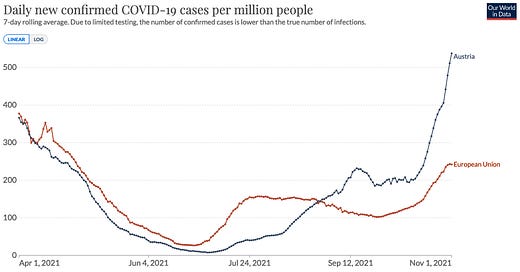The Fourth Wave
Austria's new government is struggling to respond to the fourth wave of the coronavirus pandemic which has hit the unvaccinated especially hard
Servus!
Austria had the chance to avoid a fourth wave of the coronavirus and it blew it. Following a period of relative stability at the end of September and beginning of October, case numbers have begun to skyrocket. On November 1, there were 58,520 active cases in the country, and the seven-day incidence rate per 100,000 people stood at 408.7: more than twice what it had been on October 15. Of particular concern are the number of COVID-19 patients in the ICU: now 306. 15 percent of intensive care beds nationwide are current occupied by COVID-19 patients. In the coming weeks, that figure will only increase.
The cause of this fourth wave is no mystery. If one examines Austria’s coronavirus data at the state level, there is an evident link between the number of active cases, the percentage of folks fully vaccinated against the virus, and the stringency of measures designed to stop the virus’ spread. Upper Austria simultaneously has the lowest vaccination rate in the country (59.2 percent of residents have a valid vaccination certificate1) and the highest rate of infection (a seven-day incidence rate of 623.9). Salzburg has the second-lowest vaccination rate and the second-highest incidence rate.
Vienna, meanwhile, has the lowest incidence rate in the nation (234.6), and while it doesn’t have the highest vaccination rate, it does have the largest publicly-available PCR testing program and enforces the most stringent mask, testing, and vaccine passport rules. Other states like Styria are beginning to follow Vienna’s lead. Elsewhere, districts in which the seven-day incidence rate is climbed above 400 are being made subject to a cordon sanitaire, meaning only those who have been fully vaccinated, recovered from COVID-19, or tested negative can enter or leave. At midnight last night, six more districts were sealed off. The current response to the fourth wave looks more like a game of whack-a-mole than a coherent program of countermeasures.
As the new chancellor and his health minister are now discovering, while the crisis of government which resulted in Sebastian Kurz’s resignation may have pushed COVID-19 off the front pages, it didn’t make the pandemic disappear. On Tuesday, health minister Wolfgang Mückstein rolled out the country’s coronavirus booster program: third shots for everyone six months after receipt of their second, putting the country in line with Israel among others. Chancellor Alexander Schallenberg plans to bring Austria’s governors together on Friday for a meeting in Vienna at which the future direction of Austria’s COVID-19 countermeasures will be thrashed out.
Schallenberg has been bequeathed by Kurz a system for judging the severity of the pandemic and when to introduce countermeasures that is no longer fit for purpose. The current metric is: The more intensive care beds that are occupied by COVID-19 patients, the most severe the measures to counteract the virus. The problem is, by the time ICU beds are occupied, it is too late to do anything about it. Kurz’s system, as Styria’s governor Hermann Schützenhöfer said the other day, is a reactive and not a proactive one—one that always leaves the state on the back foot.
The state—indeed, the political system as a whole—has also been oddly passive when it comes to the vaccine. Whatever public information campaigns there are on television and in the newspapers are having little to no impact on the vaccination rate (perhaps because the unvaccinated are getting their information elsewhere); all political parties from left to right appear extremely reluctant to do anything that may inconvenience the lives of the unvaccinated (who are also, keep in mind, potential voters). But inconveniencing them as to make them do the right thing may now be Austria’s only way out of this fourth wave—the wave of the unvaccinated.
Bis bald!
Thank you for signing up to the Vienna Briefing. If you know someone who would be interested in receiving this newsletter, consider sharing it with them today.
Net Zero
Austria aims to reach net zero on carbon emissions by 2040 and to procure 100 percent of its energy from renewable sources by 2030, chancellor Schallenberg announced at the COP26 climate summit in Glasgow.
Unemployment Sinks
Austria’s unemployment levels continue to trend in the right direction. 12,884 fewer people were registered as unemployed in October 2021 when compared with the same month two years prior before the pandemic. However, 71,279 workers were furloughed in October compared with 66,044 the month before.
Thiem Vaxxed
Dominic Thiem has been vaccinated against the coronavirus. The tennis superstar was said to have been waiting for the Novavax vaccine to come onto the market, but following interventions from health minister Mückstein among others, he seems to have changed his mind. His vaccination comes ahead of a planned comeback at an exhibition tournament in the UAE in December.
Having a valid vaccination certificate means you have either received two doses of a vaccine or one having contracted and then recovered from COVID-19.




